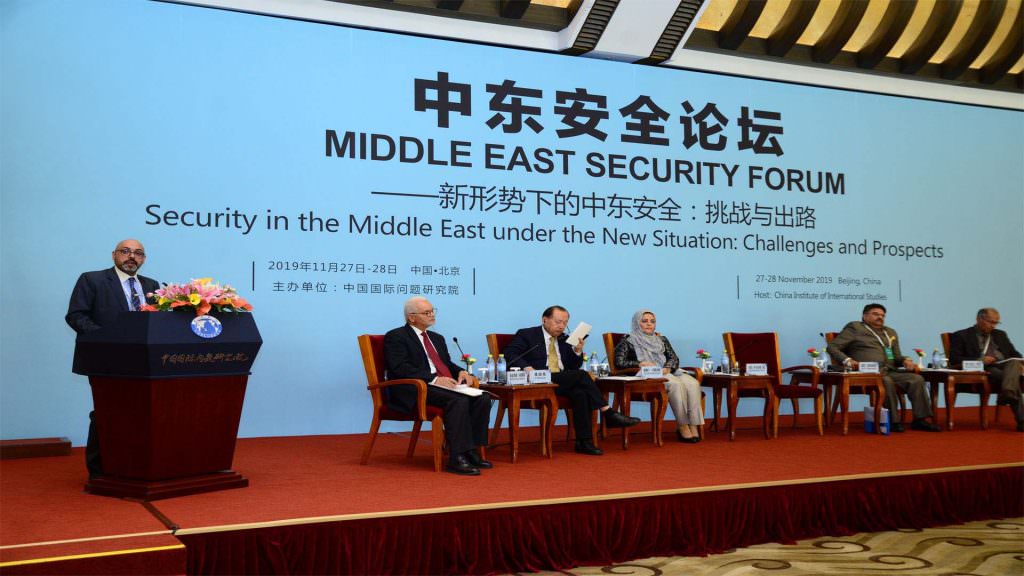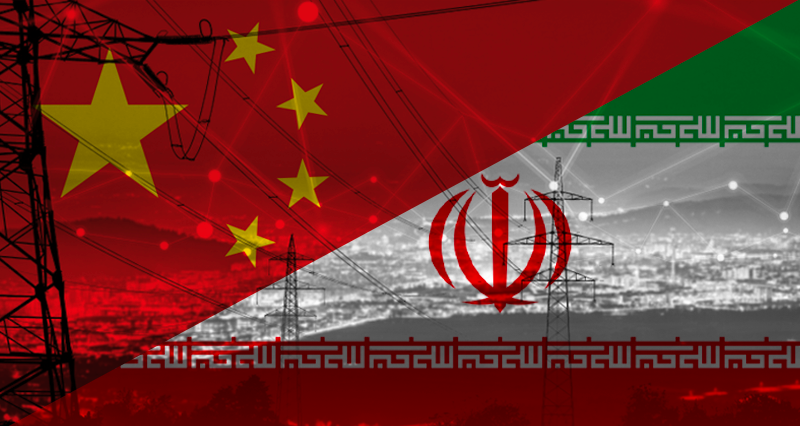While tensions around Palestine are increasing, with an Israeli ground operation imminent and the forces of the Resistance responding over all of the region, from Iraq to Yemen, from Lebanon to Syria, the Chinese Foreign Minister travelled to New York to meet his US counterpart.
China has taken a clear stance in the conflict, reitareting the demand for a two-state-solution and rejecting Israel’s operations as going beyond self-defense.
Furthermore, Beijing had become more active in Middle Eastern diplomacy by mediating between Iran and Saudi Arabia. China had also presented a plan for the solution of the Palestinian-Israeli conflict.
We spoke about the global aspects of the conflict, the Chinese position, the future of normalization processes with Prof. Yang Chen. Professor Yang is the Executive Director of the Center for Türkiye Studies in the University of Shanghai.
Does China consider the conflict as a regional one or as another example for the US’ unipolarity?
Thank you for your question. From the current situation, it seems that this conflict is a war between Hamas and Israel, and other Middle Eastern countries have not directly participated in the war. However, from a Chinese perspective, I believe that the Palestinian-Israeli conflict is not only a regional issue, but also a global issue. It is a core issue in the Middle East, with complex reasons behind it, including historical, religious, ethnic, and major power’s intervention, all kinds of factors, which have led to the outbreak of five Middle Eastern wars. So, since the outbreak of this conflict, we have been worried about whether it will evolve into the 6th Middle East War. For Israel, it is estimated that they did not expect such a strong Hamas attack. This attack breaks the myth of Israel’s invincibility and brings the world’s focus back to the Israeli-Palestinian issue. In fact, in the past 20 years, especially since the Arab Spring, the Palestinian issue has been somewhat marginalized, and a lot of new issues come out, for example, the Syrian issue, the Yemen issue, and so on. This conflict once again reminds the world of the importance of the Palestinian issue.
Regional war will pose “challenge to US Middle East policy and cause significant losses for its global strategy”
Looking at the attitude of the United States, we observed that after the conflict, US Secretary of State Antony Blinken conducted shuttle diplomacy in the Middle East, and President Biden also visited Israel. We can draw two conclusions from the two visits. On the one hand, the United States remains firmly on the side of Israel, as Israel is the most important ally of the United States in the Middle East, and ensuring Israel’s security is one of the core interests of the United States’ Middle East policy. On the other hand, in reality, the United States does not want this conflict to become a regional war, which is not in line with the current global strategy of the United States. The global strategy of the United States is to contain China and Russia. Currently, Russia has been trapped in the Russia-Ukraine conflict and cannot exert greater pressure on the United States in the Middle East. For China, starting with Trump, the United States has been strategically contracting in the Middle East and withdrawing its troops from Afghanistan, with the goal of dealing with China. However, its withdrawal from the Middle East will leave a power vacuum. So, what will US do? Pressing Arab countries to establish diplomatic relations with Israel to ensure Israel’s security, which can also continue the hegemony of the United States in the Middle East. But if Israel launches a large-scale attack on Gaza, this conflict will become a regional war, which will pose a challenge to the United States’ Middle East policy and cause significant losses to its global strategy. If this happens, there is no doubt that the United States’ influence in the Middle East will become weak.
Normalization process in the Middle East “maybe suspended, but it will not stop”
China has begun a regional initiative by mediating between Iran and Saudi Arabia. Does Beijing see that rapprochement endangered by the current conflict?
I would like to give my conclusion first, that is that the trend of reconciliation in the Middle East may be suspended, but it will not stop. It’s understandable that the reconciliation may have some twists and turns, but it will still continue.
Several reasons are as follows. Firstly, the reconciliation between Iran and Saudi Arabia is the key to achieve peace in the Middle East. In the past decade, the conflict between Iran and Saudi Arabia has been the biggest conflict in the Middle East. However, since the Russia-Ukraine conflict, the influence of major countries in the Middle East has declined, including the United States and Russia. We see that the strategic autonomy of these countries is increasing, and they are not choosing sides between big powers, so they can gain more opportunities for self-development. Before this conflict, the reconciliation between Saudi Arabia and Iran is very beneficial for the two countries’ own development.
Secondly, Middle Eastern countries have a deep motivation for reconciliation. Since the Arab Spring, the Middle East has gone through 10 years of wars, with many countries experiencing economic collapse, people being displaced, and some countries being occupied by various forces, resulting in a state of instability. More and more countries and people are realizing that war cannot solve problems, and no one can conquer others. Development and peace are particularly precious. For example, Türkiye’s relations with Arab countries and Israel have improved, Arab-Israeli relations have improved to some extent, the Arab League has readmitted Syria, the relations between countries in the GCC is improving, and the most important thing is the reconciliation between Iran and Saudi Arabia. After the reconciliation, a lot of conflicts became not so serious.
Thirdly, if this conflict escalates into a regional war, it will trigger anti-Israeli and anti-American actions in the Middle East. At that time, whether it is Saudi Arabia, Iran, or other Middle Eastern countries, they will all support the Palestinians. This actually helps to unite Middle Eastern countries and promote further cooperation among these countries.
News about Chinese plans to organize international conference on the issue
Which efforts does China consider to increase its mediating role in the Palestine conflict?
After the outbreak of the conflict, China proposed four propositions. The first is to cease fire and stop the war as soon as possible, prevent the war from expanding indefinitely, and avoid further deterioration of the situation; The second is to comply with international humanitarian law, fully ensure the safety of civilians, open up humanitarian rescue channels as soon as possible, and prevent serious humanitarian disasters from occurring; The third is that all countries concerned should maintain calm and restraint, uphold objectivity and fairness, promote the downgrading of conflicts, and avoid greater impacts on regional and international security. Fourthly, the United Nations should play its due role in resolving the Palestinian issue, and the Security Council should assume important responsibilities for this, form international consensus as soon as possible, and take practical measures. Provide emergency humanitarian assistance to the Gaza Strip and the Palestinian National Authority through United Nations channels. Besides, China’s Special Envoy for the Middle East also visited the Middle East and attended the Palestine Summit in Egypt.
It should be emphasized that China’s stance on the Palestine-Israel issue has been consistent and continuous, and there has been no significant change in the past few decades. Israel has the right to establish a state, and Palestine also has the right to establish a state. Israelis have the right to exist, and Palestinians also have the right of existence. The Jewish people have their own homelands now, but when can the Palestinian people return home? Israel has been established, but when will the Palestinian state be established? In fact, China are friends with both Israelis, and Palestinians. China is not favoring anyone, but standing on a just and fair standpoint.
It seems that the summit in Egypt was not good. For the future actions, I saw the news that China will call for a larger-scale conference to discuss the Israeli-Palestinian conflict. I remember a few years ago when China took the initiative to invite Israel and Palestine to have face-to-face talks in China. In recent years, in addition to the Belt and Road Initiative, China has also proposed the Global Development Initiative, the Global Security Initiative and the Global Civilization Initiative. We also organized a Middle East Security Forum to promote the construction of a new Middle East security architecture and achieve common regional security. China hopes to contribute more in solving the problems of Middle East. China’s principle is always adhering to the “two supports”, which means supporting Middle Eastern countries to unite and collaborate to solve regional security issues, and supporting Middle Eastern people to independently explore their own development path. But to be honest, the Palestinian issue is too complex and may still take a long time to finally resolve. But definitely, China will put more emphasis on this issue in the future.
This interview was conducted on behalf of and first published in Spanish on TeleSUR TV.

















Leave a Reply